The Fairmount College newsletter is published two times a year. For information, contact Cheryl K. Miller, writer and coordinating editor, at 316-978-6659 or cheryl.miller@wichita.edu.
Photo credits: Cheryl K. Miller; courtesy photos; Wichita State University Libraries, Special Collections and University Archives
Newsletter Section Menu
Research Experiences Strengthen Undergraduate Education Dean's Message Faculty Spotlight Undergraduate Research and Creative Activity Opportunities Emeriti Faculty WEIS Expands Curriculum 2022 Tenure and Promotion Candidates Faculty and College Awards Become More to Highlight Liberal Arts and Sciences Education In Memoriam Student Accolades Faculty and Staff Accolades Annual Report
Research Experiences Strengthen Undergraduate Education
Anne Wasinger is a bona fide researcher about to get a publication credit in an edited volume on fashion and politics. She’s a sophomore, double majoring in political science and English.
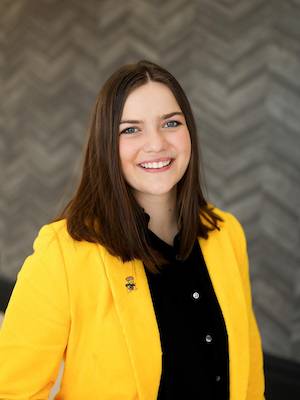
Along with Alex Middlewood, assistant professor of political science at Wichita State, and Noah Schwartz, assistant professor of political science at Concordia University (Montreal), Wasinger is working to understand the junctions of fashion, gun politics and political values.
“This research seeks to understand how citizens utilize fashion to express their political affiliations and ideology,” Wasinger said.
Middlewood further explained the complexity of the research.
“We are examining how gunowners express their political values through clothing choices and what this means for gun politics more broadly,” Middlewood said. “We argue that as the focus of gunowners has shifted to self-defense, tactical clothing has been increasingly popularized as a form of political expression.”
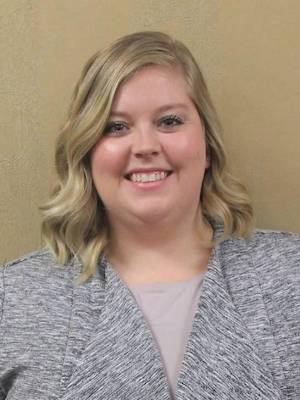
Wasinger is assisting Middlewood and Schwartz with content analysis, a method of researching communication patterns, which may include words, themes or concepts.
“We’re looking through a handful of firearms-specific magazines from 1992 to the present for advertisements of tactical and political clothing or accessories,” Middlewood said. “We are using those ads to build a dataset that we will use for our analysis.”
Wasinger is reviewing two sets of magazines for advertisements depicting firearms-related gear, clothing and accessories. For example, her review includes shirts with Second Amendment logos or text, tactical vests, hats depicting firearms, gun-related jewelry and tactical-style baby carriers. Her analysis of the content of these ads will be part of a larger compiled dataset used for this project.
Applied learning for all
Wasinger’s experience is a direct outgrowth of an expectation President John Bardo set forth for Wichita State shortly after he arrived in 2012. He wanted to guarantee that every Wichita State student had an applied learning or research experience, regardless of the nature of their academic program.
Her own research experience is reinforcing what she is learning in the classroom, Wasinger said. She is enrolled in PolS 365, Political Data Analysis, this semester.
“My work with Dr. Middlewood directly correlates to the concepts I am learning every week in class,” Wasinger said. “It's a unique experience to be able to learn a concept in class on a Tuesday, and in the same week, turn around and apply that concept to a research project in real time.”
Coleen Pugh, who serves as dean of the graduate school and vice provost for research, believes that experiences like Wasinger’s give depth to what is learned in the classroom.
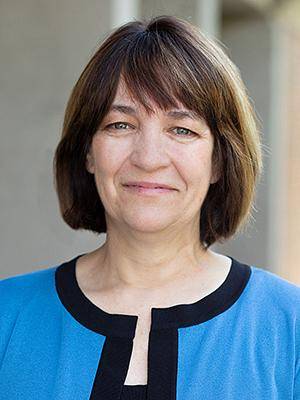
“It really helps to test and cement the concepts that students learn in class and brings them to life,” Pugh said, who is also a professor of chemistry. “Actually looking at those concepts in a research setting makes it much more interesting.”
Part of Pugh’s role is to encourage departments to promote undergraduate research. She outlined what students should expect.
“They should have a grace period where they’re not expected to be experts on what they’re doing. They have to kind of embrace and enjoy working on something that—maybe everything—is new but know that it will come to them eventually.
“They should expect to have someone who guides them until they are ready to work more independently, and to be able to do that at their own pace,” Pugh said. “They will be taught how to do what they need to learn.”
It’s not only the undergraduates who gain something. As Wasinger’s mentor, Middlewood has also benefitted.
“Involving Anne in my research has also helped me become a better scholar,” Middlewood said. “It has forced me to take a step back and think about how to best explain concepts and processes to someone who isn’t as immersed in research and the field of gun politics as I am.”
What the Student Researchers Gain
Students receive varying forms of recognition for their research work. Some earn an hourly research wage, while others count the experience as an applied learning requirement for their degree. Students may present papers at local, regional, or national professional conferences. A few may have co-authorship on publications or research mentions by their faculty mentor.
Wasinger receives a combination of benefits. She is compensated through department donor funds, which she said allows her to focus on the project without worrying about finances. She will also be listed as a co-author on the chapter Middlewood and Schwartz are working on.
Middlewood believes that in interacting with Schwartz, Wasinger is also developing collaboration and networking skills. However, her newly gained research skills have the greatest value of all.
“I see the biggest benefit as helping Annie develop her research skills and hopefully find a love of research in her own right that she can carry on into the rest of her college career and beyond,” Middlewood said. “She has such great insights and asks great questions. Thinking through a research question from start to finish, including how to take concepts, develop variables, and then measure those variables can be difficult to learn in a classroom because it is very different from traditional classroom learning.”
For more stories of student research projects, visit www.wichita.edu/las/GenNews.
Return to Newsletter Section Menu
Dean's Message
Dear Fairmount College alumni, faculty, staff and friends:
One of the highlights of serving as dean is welcoming new faculty into Fairmount College. The setting is the Wichita Art Museum, an oasis of calm in a hectic schedule of orientation events. My message to the new faculty is to stay passionate about what they are passionate about, and to be prepared to promote their field of study. This is because I know their passion can be contagious.
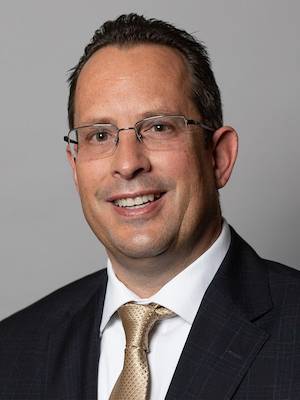
When I meet with faculty over a coffee or a beer, I always bring up their research program. The challenges, the discoveries, the context of the problem — all of which are communicated with an energy and enthusiasm that elicits in me something akin to joy. For a moment, I am caught up with them in the enthusiasm. It is contagious. I tell new faculty that their passion is contagious, but not only for their colleagues. Our students can also be caught up in the moment.
Wichita State is one of only three Kansas Board of Regents universities with a research designation. This means that Wichita State’s Fairmount College serves as a destination to participate in research challenges and discoveries. Our mission, as a college is to infect our students with the love of research. This is readily observable in our graduate programs but is equally intentional with our undergraduates. We want students pursuing a bachelor’s degree to share in the unique experience that answering a research question offers. We want our students to understand that a discipline includes many areas that have yet to be settled, and this very fact opens a space for them to occupy, in collaboration with our faculty. Learning happens within and beyond the textbook.
In the Fairmount College of Liberal Arts and Sciences we take our undergraduate research mission seriously.
- Every year the Kansas Idea Network of Biomedical Research Excellence annual symposium gathers undergraduate students in biological sciences to disseminate their research.
- Our chemistry and biochemistry students participate in the First Year Research Experience hosted by the Cohen Honors College to take up research positions in labs.
- The Summer Research Institute draws first-year and transfer students into a weeklong lab-based research session.
- In the humanities, our students have the opportunity to write research articles for in-house journals such as the history department’s Fairmount Folio and the English department’s Mikrokosmos.
- The Diverse Women’s Conference provides an opportunity for all students to present poster and papers.
- The Gender and Sexuality in Kansas conference is another place for undergraduates to present their research.
- Additionally, many of our faculty apply for and win grants that provide undergraduate research opportunities, and every year many of our students present their research at the Kansas Undergraduate Research Day at the Capitol.
None of this would be possible without a research-based student-centered faculty who are driven to share what they love doing with our students. When you think of the excellent research being carried out in the college, remember that research for us is inseparable from teaching; and as we strive to learn new things, we want to take the students along with us on the joyous journey of discovery.
Yours,
Andrew Hippisley, Dean
Return to Newsletter Section Menu
Faculty Spotlight: Alex Middlewood
Alex Middlewood has been interested in politics and government for as long as she can remember. She has especially vivid memories of the 2000 presidential election, which led to the U.S. Supreme Court case Bush v. Gore, ending the Florida recount dispute.
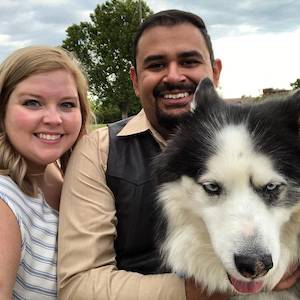
Middlewood, assistant professor of political science, focuses her research on the political behavior and attitudes of American gunowners, specifically women.
“Since the 1980s, we've been in what we call self-defense gun culture,” Middlewood said. “Most people own guns specifically for self-defense, and that resonates with people from all sorts of different demographic backgrounds, including women. We've really seen this targeting of women to own guns.”
This targeting includes the marketing and promotion of merchandise, ranging from pink handguns to skirts, bags and jackets designed to conceal-carry handguns and ammunition.
Middlewood is also the faculty advisor for the Model United Nations program at Wichita State. In college, she participated in MUN for three years. She has since joined the Secretariat — the executive arm — for the American Model United Nations conference and is the associate executive director.
Her best experiences with MUN involve people.
“Of course, getting to press the vote button at the United Nations General Assembly (during the National Model United Nations conference) is an amazing experience,” she said, “but I think my favorite part is all the different people who I get to meet, and all the different networking connections that I get to have. I meet so many people from all around the world and hear about their life experiences that are either similar or different from mine.”
When she’s not working, Middlewood enjoys traveling and spending time with her husband Frank, and their dog Max, a husky-malamute mix. They have traveled to New Mexico and some of America’s national parks, and plan to visit Kansas’s newest state park, Little Jerusalem, this year.
Middlewood is a native of Michigan and earned her bachelor’s degree at Central Michigan University. Her graduate work led her to complete a master’s degree at the University of Arkansas and her doctorate at the University of Kansas. All of her degrees are in political science.
Return to Newsletter Section Menu
Undergraduate Research and Creative Activity Opportunities
All Fairmount College students, regardless of major or grade point average, are encouraged to develop their research and creativity skills. In addition to the sampling of opportunities below, students are encouraged to approach faculty directly about starting or joining a project.
Fairmount Folio, history journal
Founded in 1996, the Fairmount Folio is a history journal which publishes the work of students at Wichita State University. Topics have included American, European and Asian cultural, political, economic, and social themes, from ancient to modern times, but are not limited to any geographical region.
First-Year Research Experience
FYRE connects first-year students with hands-on research experiences in a variety of STEM-related disciplines. Students enroll in an introductory research seminar that exposes them to research methods and are matched with research positions in WSU labs actively involved in scholarly STEM research.
Kansas Undergraduate Research Day at the Capitol
Each year, students present their research findings and experiences to state legislators in Topeka. Forty Kansas undergraduates from the eight public, four-year universities showcase their work, demonstrating the opportunities students have to collaborate with faculty members. The event also emphasizes the role higher education plays in producing educated citizens and a skilled workforce to advance Kansas’s economic growth.
Kansas-IDeA Network of Biomedical Research Excellence
K-INBRE provides research funding and stipend support for undergraduate students involved in biomedical-related research. K-INBRE’s annual statewide symposium features oral and paper presentations of undergraduate research projects. K-INBRE helps prepare university students for bioscience careers in Kansas.
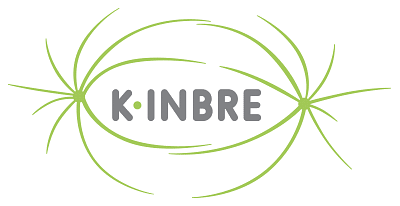
McNair Scholars Program
A federal TRIO program, 28 eligible high-achieving undergraduate students are prepared for graduate studies leading to the Ph.D. McNair Scholars Program students gain research training and early scholarly experiences, allowing them to define goals and develop critical skills needed for success at the doctoral level. Students prepare for careers as college-level professors and researchers.
Mikrokosmos and mojo, literary journals
Mikrokosmos, the literary journal of Wichita State’s MFA program, has been publishing for more than fifty years and is open to undergraduate, graduate and alumni submissions. The national online counterpart to Mikrokosmos is mojo.
Summer Research Institute
Incoming first-year Wichita State students who have graduated from high school or are community college transfer students interested in STEM majors may participate in SRI. Students spend a week engaged in research-focused academic sessions and collaborate in a Wichita State faculty’s research laboratory. Student research groups compile a review of literature, formulate an educated hypothesis and methods, conduct data collection, analyze data, and showcase findings in an oral presentation. This summer program is hosted by WSU’s Dorothy and Bill Cohen Honors College.
Undergraduate Research and Creative Activity Forum
Students from all disciplines present their scholarly research to the Wichita State community. In this juried research competition, winners receive $250 for first place and $100 for second place. Students make either oral or poster presentations based on their research conducted under the guidance and mentorship of a WSU faculty member.
Return to Newsletter Section Menu
Emeriti Faculty
Several Fairmount College faculty retired recently with emeriti status. This is an honorary designation conferred upon retirees in recognition of their contributions and accomplishments over their years of service to the university.
- Richard N. Armstrong, associate professor emeritus of communication
- Melvin A. Kahn, professor emeritus of political science
- Daowei Ma, professor emeritus of mathematics, statistics and physics
- Phillip E. Parker, professor emeritus of mathematics, statistics and physics
- Kathleen M. Perez, associate professor emerita of sociology
Return to Newsletter Section Menu
Department of Women’s, Ethnicity, and Intersectional Studies Expands Curriculum
The Department of Women’s, Ethnicity, and Intersectional Studies (formerly the women’s studies department) has reorganized and expanded its curriculum to reflect growing national interest in gender issues and ethnicity.
“We are excited about the new name and the programmatic changes it brings in placing women, gender, and ethnicity at the center of studies, especially in their intersection with race, class, sexuality, disability, and other hierarchies of power and relations of power,” said Chinyere Okafor, chair and professor of women’s, ethnicity, and intersectional studies.
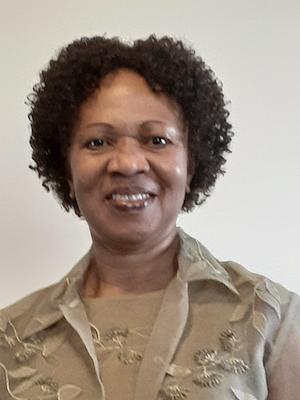
Robin Henry, an associate professor of history who chaired the transition steering committee, said the department’s name reflects the academic, pedagogical and programmatic changes that have transformed women’s studies since 1971, when the women’s studies department was founded.
“It highlights the lived experiences of students and members of the campus community who realize that gender is never experienced in a vacuum, but in intersections with class, race, ethnicity, sexuality, age, work and regional identities,” Henry said.
“This is a repositioning and realignment to better speak to a new generation of students,” Andrew Hippisley, dean, said. “The wider scope adds, explicitly, consideration of gender, and more broadly, sexuality, ethnicity and race.”
Students majoring in WEIS will develop four competencies:
- Decenter gender as a primary form of analysis
- Investigate how ethnicity and race intersects with multiple forms of identity including, but not limited to, gender, social class, sexuality and age
- Analyze the ways in which societal institutions and power structures impact the material realities of people’s lives
- Recognize the long tradition of women’s participation and engagement in government, politics and societal advancement in Kansas
“The focus on intersectionality will empower students with multidimensional lenses that create awareness and understanding of practices, policies, and structures that are central in people’s identities and experiences,” Okafor said.
As the degree content has become more multidisciplinary, the changes also create opportunities for allied and affiliated faculty and departments across Fairmount College, such as sociology, history and social work. Affiliate faculty maintain their position in their home department, but through an affiliation with WEIS, their interdisciplinary teaching and research become formally recognized.
“The realignment of the department allows us to use the expertise we have in many other departments, making it explicitly interdisciplinary, inclusive and exciting,” Hippisley said.
Return to Newsletter Section Menu
2022 Tenure and Promotion Candidates
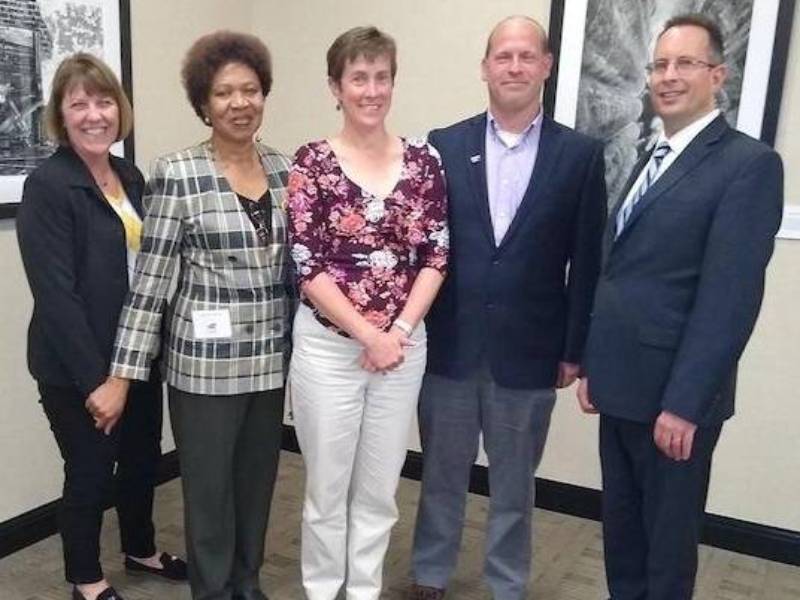
Return to Newsletter Section Menu
Faculty and College Awards
Several Fairmount College faculty received awards reflecting the high quality of their teaching, research or creative activity. The Barrier Award is presented by Fairmount College; the others are university awards.
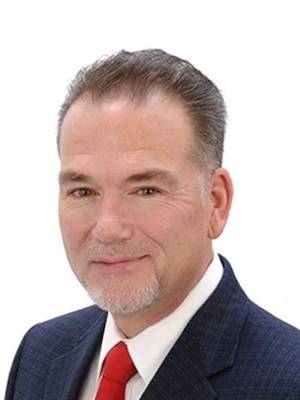 Michael Birzer, professor of criminal justice, 2022 John R. Barrier Distinguished Teaching Award,
to recognize a well-established record of excellence in teaching; an impact on the
lives and career choices of students; and the ability to apply the results of research
or the experience of community or professorial service to enliven teaching and enrich
the understanding of students.
Michael Birzer, professor of criminal justice, 2022 John R. Barrier Distinguished Teaching Award,
to recognize a well-established record of excellence in teaching; an impact on the
lives and career choices of students; and the ability to apply the results of research
or the experience of community or professorial service to enliven teaching and enrich
the understanding of students.
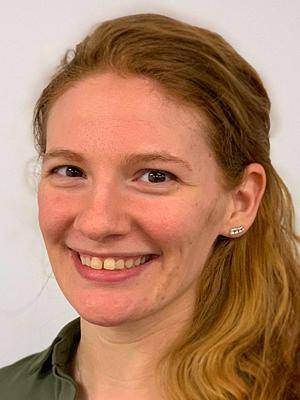 Crystal Dozier, assistant professor of anthropology, Young Faculty Scholar Award, to recognize faculty
members who are between their third and eighth years of service and have records of
excellence in teaching performance and substantial achievement in research or creative
activity.
Crystal Dozier, assistant professor of anthropology, Young Faculty Scholar Award, to recognize faculty
members who are between their third and eighth years of service and have records of
excellence in teaching performance and substantial achievement in research or creative
activity.
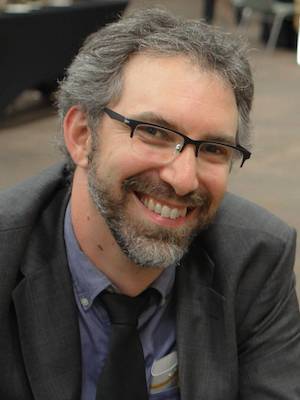 John Hammond, senior educator in mathematics, Excellence in Accessibility Award, to recognize
achieved excellence in creating an accessible learning environment for all students.
John Hammond, senior educator in mathematics, Excellence in Accessibility Award, to recognize
achieved excellence in creating an accessible learning environment for all students.
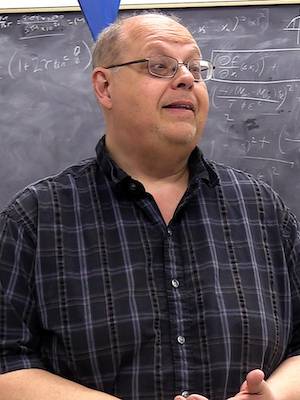 Nick Solomey, professor of physics, Excellence in Research Award, to recognize establishment of
an exemplary record of research that has advanced the university’s research mission.
Nick Solomey, professor of physics, Excellence in Research Award, to recognize establishment of
an exemplary record of research that has advanced the university’s research mission.
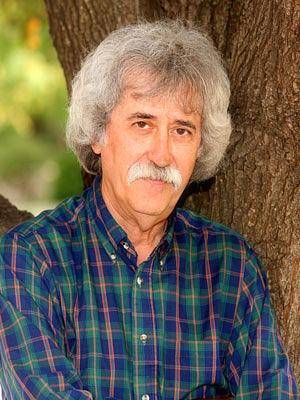 Rob Zettle, professor of psychology, President’s Distinguished Service Award, for outstanding
service to the university community beyond the job description.
Rob Zettle, professor of psychology, President’s Distinguished Service Award, for outstanding
service to the university community beyond the job description.
Return to Newsletter Section Menu
Become More Internal Campaign to Highlight Liberal Arts and Sciences Education
Ask any Wichita State undergraduate student what their major is, and they will tell you almost immediately. Ask them which college they’re in and you may get a blank look in return.
Andrew Hippisley, dean of the Fairmount College of Liberal Arts and Sciences, wants Fairmount College students to embrace their identity as recipients of a liberal arts and sciences education. In the fall of 2020, a small group of Elliott School of Communication faculty and alumni met to design an internal campaign recognizing Fairmount College and its role in helping students grow beyond a career-only education.
Their aim was to accomplish three things for Fairmount College:
- Connect current and prospective students to the benefits of a liberal arts and sciences degree and inspire them to pursue it as a path of learning
- Unite all liberal arts and sciences faculty and staff
- Distinguish liberal arts and sciences from other Wichita State colleges
The result: Become More.
The customizable Become More tag line encapsulates the overarching benefit of a liberal arts and sciences education and distinguishes what is important about Fairmount College.
Student focus groups and the Fairmount College faculty assembly responded positively to the Become More tag line and campaign, as did the Fairmount College Advisory Council, made up of approximately 20 alumni.
Academic departments may customize Become More by including a relevant adjective in the Become More graphic. For example, the philosophy department might use “Become More Thoughtful.” Additionally, the Become More graphic may be used in social media posts, department websites and on promotional items for current and prospective students.
The Become More image will soon be a large-scale display in the entry of Lindquist Hall. Fairmount College department office signs will also receive a makeover, and faculty and staff may order stationery and business cards featuring the graphic.
To see how one department uses Become More, visit www.wichita.edu/geology.
Return to Newsletter Section Menu
In Memoriam
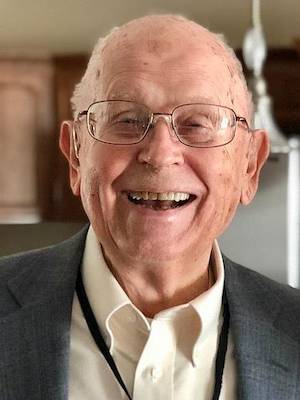 Donald G. Killian, 91, died March 19, 2020. He retired from Wichita State as an associate professor
of mathematics in 1994. Memorials have been established with the WSU Foundation, 1845
Fairmount St., Wichita, KS 67260-0002; and University Congregational Church, 9209
East 29th Street North, Wichita, KS 67226.
Donald G. Killian, 91, died March 19, 2020. He retired from Wichita State as an associate professor
of mathematics in 1994. Memorials have been established with the WSU Foundation, 1845
Fairmount St., Wichita, KS 67260-0002; and University Congregational Church, 9209
East 29th Street North, Wichita, KS 67226.
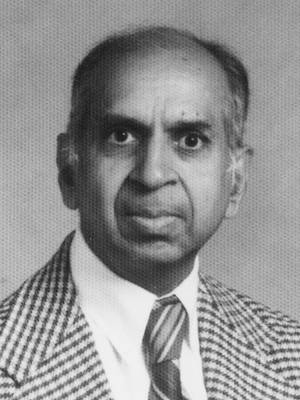 Prem N. Bajaj, 89, died Dec. 30, 2021. A professor of mathematics, he taught for 33 years at Wichita
State, retiring in 2001. Memorials may be made to the Bajaj Family Scholarship Fund,
which is intended to support need-based graduate mathematics students attending Wichita
State. Contact the WSU Foundation, 1845 Fairmount St., Wichita, KS 67260-0002.
Prem N. Bajaj, 89, died Dec. 30, 2021. A professor of mathematics, he taught for 33 years at Wichita
State, retiring in 2001. Memorials may be made to the Bajaj Family Scholarship Fund,
which is intended to support need-based graduate mathematics students attending Wichita
State. Contact the WSU Foundation, 1845 Fairmount St., Wichita, KS 67260-0002.
Return to Newsletter Section Menu
Student Accolades
Kelly Adams earned second place for Poster Presentation: Applied Science at the Undergraduate Research and Creative Activities Forum. Kaitlyn Hemberger won second place for Oral Presentation: Social Sciences and Humanities, also at URCAF, and first place for the University Libraries Undergraduate Research Award. Rory Mata earned third place in the same library competition. These students all participate in assistant professor Mythili Menon's linguistics lab.
Stephanie Bristow, biological sciences, was selected for the 2021 Rosalee and Alvin Sarachek Award for Scholarly Excellence in the Natural Sciences. The award is given annually to a graduating senior majoring in biological sciences, chemistry, geology, or physics in the Fairmount College of Liberal Arts and Sciences. Bristow focused on ecology and organismal sciences. She assisted Thomas Luring, assistant professor, with research projects involving aquatic vertebrates and mapping ephemeral streams and stream pools across several years.
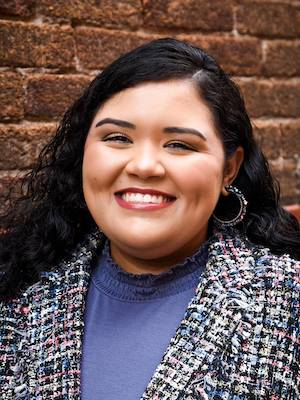 Graduate student Rachel Embray was selected to join the Council on Social Work Education Student Advisory Committee.
CSWE is the accrediting body for social work education in the United States and plays
an important role for students to learn about social work, advance in their careers,
and contribute to the profession as educators.
Graduate student Rachel Embray was selected to join the Council on Social Work Education Student Advisory Committee.
CSWE is the accrediting body for social work education in the United States and plays
an important role for students to learn about social work, advance in their careers,
and contribute to the profession as educators.
Aaron Fater, K-INBRE STAR scholar, biochemistry major, and undergraduate researcher in the Beck Lab, was selected for a poster award at the 20th annual K-INBRE Symposium. K-INBRE is the Kansas-IDeA Network of Biomedical Research Excellence.
Kaitlyn Hemberger, applied linguistics, won the John Britt Poster Award for the best poster in Humanities at the Great Plains Honors Council Conference. Titled “Investigating the Nature of Borrowed French Color Terms in Congolese Kiswahili,” it was part of her senior honors thesis and applied linguistics capstone.
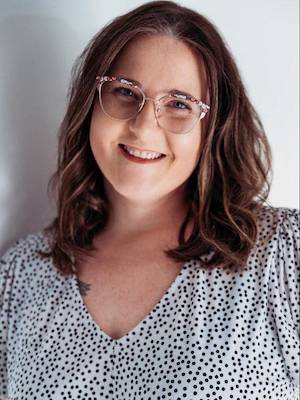 Courtney Mariano, graduate student in social work, was selected for a Loud Light Fellowship. Loud
Light students participate in a voting rights and student power training program,
where they learn more about the public policy process, attend legislative committee
meetings and floor debates, and help to break down complex topics for sharing within
the campus and wider community.
Courtney Mariano, graduate student in social work, was selected for a Loud Light Fellowship. Loud
Light students participate in a voting rights and student power training program,
where they learn more about the public policy process, attend legislative committee
meetings and floor debates, and help to break down complex topics for sharing within
the campus and wider community.
Ava Munzinger-DeFrain and Savannah Redfern won first place for Poster Presentation: Social Sciences and Humanities at the Undergraduate Research and Creative Activities Forum. They are students in Assistant Professor Jennifer Demer's psychology lab.
Justin Oettle, biological sciences, is the 2022 Rosalee and Alvin Sarachek Award for Scholarly Excellence in the Natural Sciences. A student of Thomas Luring’s, assistant professor, Oettle assisted with research projects involving the effects of drought and vertebrate colonization on nutrient cycling in intermittent streams as well the aquatic systems of the Wichita State University Biological Field Station reserves.
Six Fairmount College students were selected as Senior Honor Men and Women. This highly competitive honor is awarded to students who demonstrate outstanding scholarship, leadership and involvement at Wichita State, and service to Wichita State and the surrounding community. The students are:
Samuel Bartel, mathematics;
Kaitlyn Hemberger, applied linguistics;
Olivia Martinez, Spanish and American Sign Language;
Justin Oettle, biological sciences;
Emily Rodriguez, social work; and
Rebecca Stansfield, integrated marketing communication.
Eight students are participating in the Washington, D.C./Topeka Internship Program this spring semester, coordinated through the department of political science. Placements are available with members of Congress, the executive branch, interest groups, environmental organizations, education and trade associations, news agencies, embassies, political think tanks and other entities. Students receive financial support for housing and transportation during their internships.
Washington, D.C.
-
- Ambrosia Naramore-Winfrey, Rep. Grace Meng (D-New York)
- Francisco Medina, FairVote, a democracy promotion interest group
- Drew Taylor, Arc Initiatives, a progressive communication and mobilization firm
- Ariel Dillon, Wave Fundraising, for the American Civil Liberties Union
Topeka
-
- Vishnu Avva, Gov. Laura Kelly (constituent services and government affairs)
- Charles Welker, Treasurer Lynn Rogers
- Audrey Nickel, Watkins Public Strategies, a lobbying firm
- Nathanial Blank, Watkins Public Strategies, a lobbying firm
Return to Newsletter Section Menu
Faculty and Staff Accolades
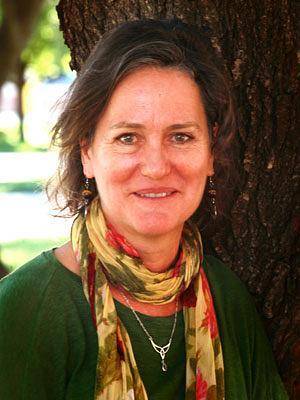 Carryl Baldwin, psychology, received Wichita State’s 2022 Phenomenal Woman Award, which recognizes
women for their accomplishments and contributions through their scholarship, activism
and commitment to excellence. Baldwin is the Carl and Rozina Cassat Distinguished
Professor of Aging and director of the Regional Institute on Aging.
Carryl Baldwin, psychology, received Wichita State’s 2022 Phenomenal Woman Award, which recognizes
women for their accomplishments and contributions through their scholarship, activism
and commitment to excellence. Baldwin is the Carl and Rozina Cassat Distinguished
Professor of Aging and director of the Regional Institute on Aging.
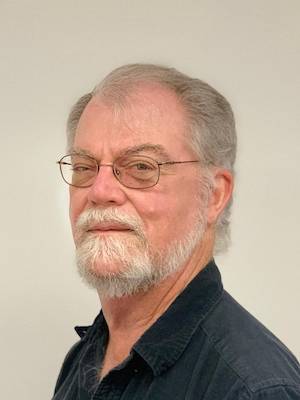 Don Blakeslee, professor of anthropology, gave the invited keynote, “Rediscovering Quivira,” at
the 2022 International Film Festival, sponsored by The Archaeology Channel. The juried
international competition in the cultural heritage/archaeology film genre shows films
featuring archaeology, ancient and indigenous cultures, and their world.
Don Blakeslee, professor of anthropology, gave the invited keynote, “Rediscovering Quivira,” at
the 2022 International Film Festival, sponsored by The Archaeology Channel. The juried
international competition in the cultural heritage/archaeology film genre shows films
featuring archaeology, ancient and indigenous cultures, and their world.
Mary Liz Jameson, associate professor of biological sciences, has been inducted as the 18th honorary member of The Coleopterists Society, an international society for the study of beetles. Her membership reflects her role in the society and scientific discipline. Jameson was the group’s third female president, serving 2005-2006, and in 2021 was elected as the third female honorary member in the society’s 75-year history.
Kerry Jones, teaching professor of English and director of the Writing Center, won the Nilsen Literary Prize for a First Novel. The prize for her book, “The Last Innocent Year,” is for writers who have not published a novel previously. It comes with a monetary award of $2,000 and a publication contract for the fall of 2023. Jones’s short story, “Love, American Style,” is forthcoming in the spring 2022 edition of “The Front Range Review.” She read portions of this story for Wichita State’s inaugural “ShockTalk” podcast in October.
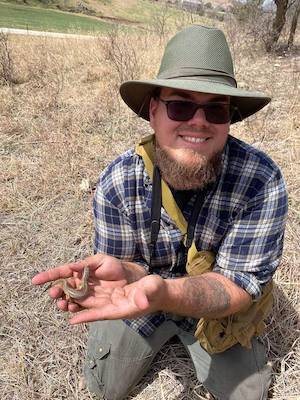 Dexter Mardis, biological sciences field station manager, has been elected to the advisory board
for the Midwest Partners in Amphibian and Reptile Conservation. The entity serves
as a regional nexus for collaboration among academia, agencies, nongovernmental organizations,
and state-level herpetological organizations within the Great Plains and Midwest to
coordinate, support, and advocate for amphibian and reptile conservation.
Dexter Mardis, biological sciences field station manager, has been elected to the advisory board
for the Midwest Partners in Amphibian and Reptile Conservation. The entity serves
as a regional nexus for collaboration among academia, agencies, nongovernmental organizations,
and state-level herpetological organizations within the Great Plains and Midwest to
coordinate, support, and advocate for amphibian and reptile conservation.
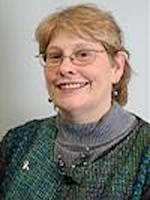 Susan McCoy, laboratory coordinator for chemistry and biochemistry, has been elected president
of the Cyber chapter of the Alliance of Hazardous Materials Professionals. The Cyber
chapter of AHMP promotes professional development and education of hazardous materials
professionals.
Susan McCoy, laboratory coordinator for chemistry and biochemistry, has been elected president
of the Cyber chapter of the Alliance of Hazardous Materials Professionals. The Cyber
chapter of AHMP promotes professional development and education of hazardous materials
professionals.
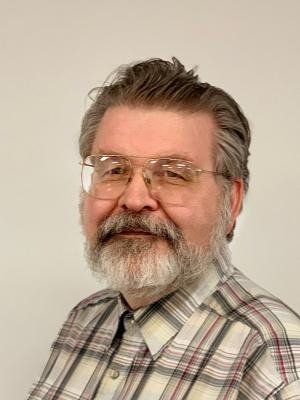 Peer Moore-Jansen, professor of anthropology, has been awarded the 2022 Outstanding Mentorship Award
for the anthropology section of the American Academy of Forensic Sciences. He was
recognized for his mentoring and guiding 150-175 graduate students during his career,
many of whom are employed in academia and in professional positions in forensic anthropology,
education, law-enforcement, and local, regional and federal human identification labs.
Peer Moore-Jansen, professor of anthropology, has been awarded the 2022 Outstanding Mentorship Award
for the anthropology section of the American Academy of Forensic Sciences. He was
recognized for his mentoring and guiding 150-175 graduate students during his career,
many of whom are employed in academia and in professional positions in forensic anthropology,
education, law-enforcement, and local, regional and federal human identification labs.
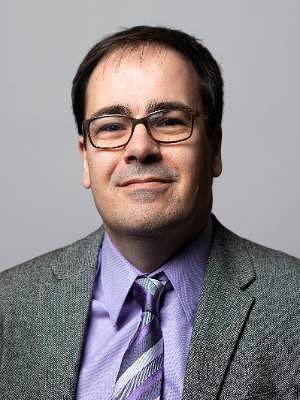 Enrique Navarro, associate professor of Spanish, has been elected as a member of the board of directors
of Humanities Kansas, an affiliate of the National Endowment for the Humanities. In
2020, Humanities Kansas awarded more than $230,000 in grants, and supported almost
400 events and grants with more than 200 community partners in Kansas.
Enrique Navarro, associate professor of Spanish, has been elected as a member of the board of directors
of Humanities Kansas, an affiliate of the National Endowment for the Humanities. In
2020, Humanities Kansas awarded more than $230,000 in grants, and supported almost
400 events and grants with more than 200 community partners in Kansas.
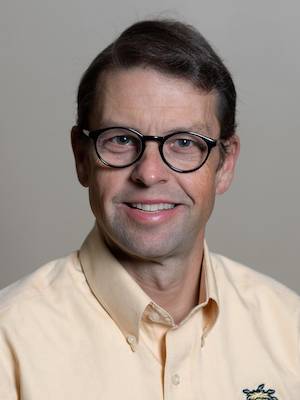 Enrique Navarro, associate professor of Spanish, and Jay Price, professor of history, received an honorable mention for Best Public Project, Somos
Wichita, from the Latin American Studies Association. You may view the project at
somos.wichita.edu/en/.
Enrique Navarro, associate professor of Spanish, and Jay Price, professor of history, received an honorable mention for Best Public Project, Somos
Wichita, from the Latin American Studies Association. You may view the project at
somos.wichita.edu/en/.
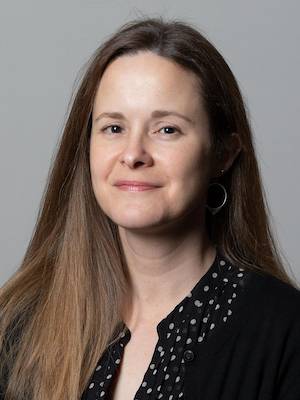 Jenny Pearson, professor of sociology, has been elected president of the Midwest Sociological Society.
The society is a nonprofit, regional, professional society dedicated to building community
among sociologists and to advancing sociological knowledge, teaching and practice
for social scientific purposes and social betterment. Pearson will serve a four-year
term starting in April as president elect-elect; followed by president elect and program
chair; president; and immediate past president. She previously served as the Kansas
state director and the co-founder and chair of the MSS LGBTQ+ Task Force, collaboratively
working toward making the organization and annual conference more inclusive for LGBTQ+
members. Pearson was also the recipient of the 2021 John R. Barrier Distinguished
Teaching Award, presented by Fairmount College.
Jenny Pearson, professor of sociology, has been elected president of the Midwest Sociological Society.
The society is a nonprofit, regional, professional society dedicated to building community
among sociologists and to advancing sociological knowledge, teaching and practice
for social scientific purposes and social betterment. Pearson will serve a four-year
term starting in April as president elect-elect; followed by president elect and program
chair; president; and immediate past president. She previously served as the Kansas
state director and the co-founder and chair of the MSS LGBTQ+ Task Force, collaboratively
working toward making the organization and annual conference more inclusive for LGBTQ+
members. Pearson was also the recipient of the 2021 John R. Barrier Distinguished
Teaching Award, presented by Fairmount College.
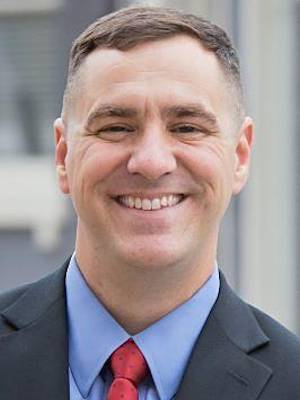 Pat Proctor, assistant professor of criminal justice, gave the keynote speech for a dinner at
the Col. Arthur D. Simons Center for Interagency Cooperation of the Command and General
Staff College Foundation in Leavenworth, Kansas. He spoke on his book, “Lessons Unlearned:
The U.S. Army’s Role in Creating the Forever Wars in Iraq and Afghanistan.”
Pat Proctor, assistant professor of criminal justice, gave the keynote speech for a dinner at
the Col. Arthur D. Simons Center for Interagency Cooperation of the Command and General
Staff College Foundation in Leavenworth, Kansas. He spoke on his book, “Lessons Unlearned:
The U.S. Army’s Role in Creating the Forever Wars in Iraq and Afghanistan.”
Mark Schneegurt, professor of biological sciences, served as the invited co-organizer for “Brines Across the Solar System: Modern Brines,” a symposium held through the Lunar and Planetary Science Institute.
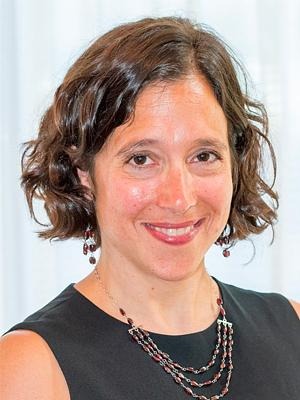 Rachel Showstack, associate professor of Spanish, has been appointed vice president of the Linguistic
Association of the Southwest, and serves as chair of the Public Affairs and Engagement
Committee of the American Association for Applied Linguistics.
Rachel Showstack, associate professor of Spanish, has been appointed vice president of the Linguistic
Association of the Southwest, and serves as chair of the Public Affairs and Engagement
Committee of the American Association for Applied Linguistics.
Return to Newsletter Section Menu
Annual Report
Academic initiatives
Aug. 1, 2021 – July 31, 2022
- Bachelor of Science Data Analysis track in Math
- Minor in Multi-organizational Leadership (Reserve Officers' Training Corps)
- Certificate in English Literature and Pedagogy Studies
- Department name changes: Women's, Ethnic, and Intersectional Studies; Chemistry and Biochemistry
Academic programs offered
Aug. 1 – July 31, 2022
- 1 associate
- 53 bachelors
- 17 masters
- 3 doctorate
- 27 certificates
The Fairmount College of Liberal Arts and Sciences continues to grow and provide new academic program offerings.
Our graduates complete their programs having gained the hard-earned skills of critical thinking, analyzing, problem solving, collaborating, listening, and communicating. Our students are equipped to pursue a lifetime of fulfillment in the workplace and in society.
About the college
- 37 Student organizations
- 7 centers and institutes
- 18 departments:
- 5 Humanities
- 5 Natural Sciences/Mathematics
- 8 Social/Behavioral Sciences
Faculty
- 105 tenured
- 83 non-tenured
- 188 total faculty
Students
Sept. 13, 2021
Undergraduate
- 5,191
- 38,545 credit hours
- 45.31% of Wichita State FTE* undergraduate students
Graduate
- 428
- 4,249 credit hours
- 17.23% of Wichita State FTE* graduate students
5,619 Total FTE* students
As the largest college at Wichita State University, we offer the greatest diversity of programs. Students can find something to fit their interests. For those wanting a more individualized program of study, academic advisors can help students tailor a bachelor of general studies degree or a field major both of which influence focus on three content areas.
*FTE, or full-time equivalent, is a 12 credit-hour load for undergraduate students, and a nine credit-hour load for graduate students.
Undergraduate major headcounts
Sept. 13, 2021
- Humanities: 305
- Natural Sciences and Mathematics: 734
- Social and Behavioral Sciences: 1,919
- Other*: 2,529
* Interdisciplinary Bachelor of General Studies and field majors, undecided, Intensive English, and guest students.
Degree production by college division
Aug. 1, 2020 – July 31, 2021
- Humanities: 91
- Natural sciences and mathematics: 148
- Social and behavioral sciences: 582
- LAS Other*: 99
* Interdisciplinary degrees, bachelor and associate degrees not affiliated with a department.
Ways we support students outside of the classroom
Liberal Arts and Sciences Advising contacts
Jan. 1-Dec. 31, 2021
- Advising appointments: 6,468
- Triage meetings with students: 281
- Campus visits: 83
- Telephone calls received at front desk:11,848
- las.advisor emails answered: 1,338
- Emails and calls to students: 12,436
Our academic advisors do more than show students how to build schedules. They also help students understand the purposes of higher education; define and develop unique abilities, goals, and aspirations; clarify values and educational and life goals; define realistic academic and professional goals; and create an individual academic plan of study for the student’s selected major. The LAS Advising Center offers in-person and virtual advising appointments.
Scholarships awarded
Aug. 1, 2019-July 31, 2021
- 2021: $638,356 — 445 awards
- 2020: $632, 809 — 403 awards
- 2019: $605,265 — 353 awards
Scholarship support can make the difference for a student who want to enroll in college. Our generous donors have made scholarships possible for hundreds of students.
Fundraising
July 1, 2020 through June 30, 2021
- Undergraduate scholarships: $1,871,987
- Graduate assistantships and fellowships: $48,495
- Program initiatives: $2,034,234
Program initiatives include projects that are not in direct assistance to students, faculty or staff, such as a speaker series or providing lab equipment.
Thank you for your financial support of Fairmount College!
Social media
Followers or subscribers as of March 30, 2022
- Facebook, started in 2015: 663
- TikTok, started in 2022:18
- Twitter, started in 2016: 367
- YouTube, started in 2020: 49
We use social media channels to inform our followers of upcoming events, study tips, majors and careers, important deadlines, and current event discussions.
Faculty Productivity
Just as students are expected to engage in activities that support their learning, faculty are expected to remain at the forefront of their research and creative activity. They are also expected to procure funding to support it. Fairmount College faculty have much knowledge to share and strive to add to the knowledge base.
Faculty publication and presentation activity
Jan. 1 – Dec. 31, 2021
- 7 books published
- 127 book chapters and articles published
Faculty awarded grants
Jan. 1 – Dec. 31, 2021
- External awards: $4,793,346
- Internal awards: $245,399


